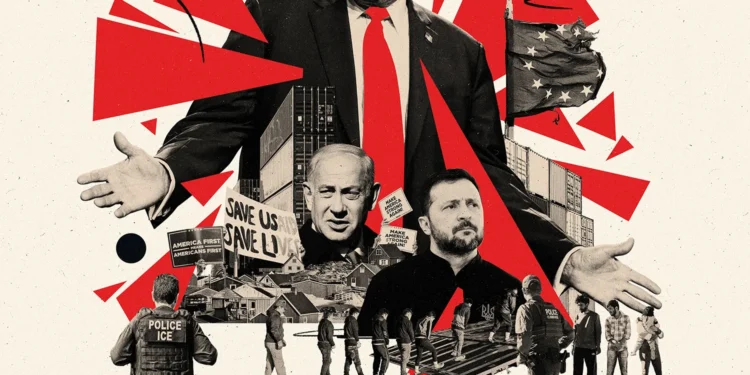In a dramatic return to his trademark hardline policies, President Donald Trump has made immigration enforcement a centrepiece of his second term. Within his first 100 days back in the White House, Trump has implemented sweeping actions targeting migrants, drawing both public support and international criticism. From revoked student visas to deportations carried out under century-old laws, the administration’s stance has reignited fierce debate over the future of U.S. immigration policy.
The president has made his position clear: “Leave the United States” — a message delivered both in tone and in practice.
Policy Actions: A Swift and Sweeping Crackdown
Among the administration’s first moves was the termination of several humanitarian parole programmes, including those benefiting migrants from conflict-ridden regions such as Ukraine. These programmes, which had allowed thousands to legally live and work in the U.S., were abruptly halted, leaving many individuals and families stranded in legal limbo.
In parallel, the administration has aggressively revoked student visas, especially for those engaged in protests or other public acts of dissent. Over 1,800 student visas have reportedly been cancelled in recent months, prompting concern from universities and civil liberties organisations.
Another wave of actions has targeted migrants who had entered through the CBP One app — a digital tool used to manage legal entry at the southern border. Many of these individuals have been issued notices cancelling their immigration status and instructing them to voluntarily depart the country.
The result: over 32,800 detentions have occurred between January 20 and March 10, according to internal Department of Homeland Security data.
Legal Controversies and Constitutional Challenges
Perhaps the most contentious move so far has been the invocation of the Alien Enemies Act, a statute dating back to 1798. Under this authority, the Trump administration deported 238 Venezuelan nationals, labelling them gang members. The deportation was carried out despite a federal judge’s order demanding their return — a move that has sparked significant legal backlash.
Civil rights groups argue the administration is operating in a grey legal area, bypassing due process and ignoring judicial oversight. Legal experts warn of a brewing constitutional crisis if the executive branch continues to defy court rulings.
Conditions inside immigration detention centres are also under scrutiny. At the Krome Detention Center in Miami, overcrowding and lack of medical care have been reported. Two detainees have died in recent weeks, allegedly due to untreated illnesses — fuelling further criticism from human rights advocates.
Personal Toll and Emotional Fallout
Behind the numbers are deeply personal stories. Mahmoud Khalil, a Jordanian graduate student at a U.S. university, was detained under suspicion of immigration fraud. He missed the birth of his child and remains in custody without formal charges. His story has become emblematic of the broader emotional toll these policies are taking on families and communities across the country.
Cases of family separations have surged again, with critics noting parallels to the widely condemned policies of Trump’s first term.
Public and Political Reactions
Despite mounting legal and humanitarian concerns, Trump’s immigration crackdown has found support among his voter base. A recent poll shows 55% of Americans approve of his immigration stance, even though his overall approval rating sits at 44%.
Political analysts suggest the strong public support stems from rising anxieties around border security, especially amid high-profile migrant caravans and border-crossing surges. For Trump, the data suggests that immigration remains one of his strongest political cards heading into the 2026 midterm elections.
International Fallout and Diplomatic Strain
The impact of the administration’s policies is also being felt globally. Under bilateral arrangements, hundreds of deported migrants — including individuals without criminal convictions — have been returned to high-security detention centres in El Salvador, notably the controversial CECOT prison.
Human rights organisations allege that many deportees were arrested and removed based on weak evidence, such as tattoos or clothing deemed suspicious by local authorities.
These deportations have strained diplomatic ties with several Latin American nations, many of which are now voicing concerns about the human rights implications and lack of due process for their citizens.
What Lies Ahead?
As Trump’s second term gains momentum, his immigration agenda is likely to remain uncompromising. More executive orders are reportedly in the pipeline, and the Department of Homeland Security is expected to introduce further procedural changes to expedite deportations and reduce legal appeals.
For migrants, students, and families caught in this sweeping crackdown, uncertainty continues to grow. For the legal community and civil rights advocates, the next 100 days may well determine the constitutional boundaries of presidential power in the immigration space.
As the administration doubles down, one thing is clear: the debate over America’s identity as a nation of immigrants is far from over.











